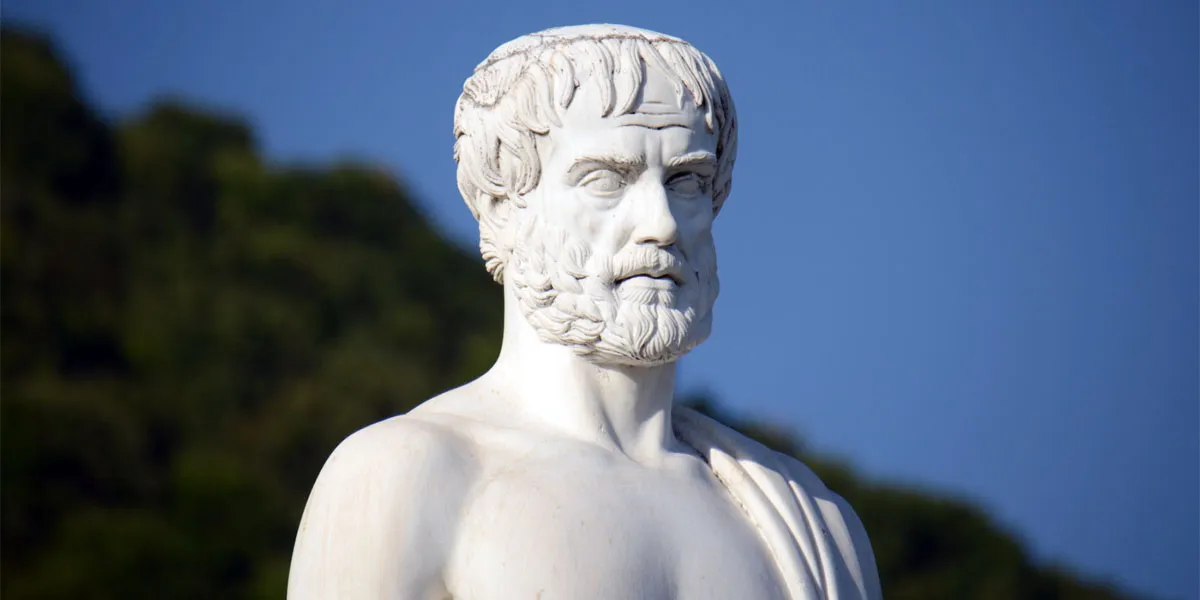
Aristotle
Philosopher and polymath

It is the mark of an educated mind to be able to entertain a thought without accepting it.

Knowing yourself is the beginning of all wisdom.

We are what we repeatedly do. Excellence, then, is not an act but a habit.

The roots of education are bitter, but the fruit is sweet.

The aim of art is to represent not the outward appearance of things, but their inward significance.

The one exclusive sign of thorough knowledge is the power of teaching.

Pleasure in the job puts perfection in the work.

Happiness depends upon ourselves.

All human actions have one or more of these seven causes: chance, nature, compulsion, habit, reason, passion, and desire.

The more you know, the more you realize you don't know.
Aristotle, born in 384 BC in Stagira, Greece, was a renowned philosopher, scientist and polymath. His wide-ranging contributions to various fields, including philosophy, biology, physics and ethics, have had a profound and lasting impact on Western intellectual thought. This article aims to explore Aristotle's remarkable achievements and shed light on his lasting legacy.
Aristotle began his educational journey in Athens, where he studied under Plato at the Academy. His time at the Academy provided him with a solid grounding in philosophy and instilled in him a deep appreciation for rational inquiry and the pursuit of knowledge.
Aristotle's work in metaphysics laid the foundations for the study of existence, substance and causality. He sought to understand the fundamental nature of reality and explored concepts such as potentiality and actuality, form and matter, and the four causes.
Aristotle's ethical theories centered on the concept of virtue. In his famous work, "Nicomachean Ethics", he postulated that the ultimate goal of human life is eudaimonia, often translated as "flourishing" or "well-being", which can be achieved through the cultivation of moral virtues.
Aristotle's political philosophy aimed to establish an ideal state governed by principles of justice and equity. He emphasized the importance of the middle class, arguing that it served as a stabilizing force in society.
Aristotle made significant contributions to the field of biology, pioneering the systematic study of living organisms. His work laid the foundations for the scientific discipline and included detailed observations on the anatomy, behavior and classification of various species.
Aristotle's work in physics was groundbreaking for its time. He formulated principles of movement, causality and the nature of the physical world. Although some of his ideas have been revised or refuted by modern science, his approach has influenced scientific thinking for centuries.
Aristotle's contributions to logic revolutionized the field of reasoning and argumentation. His system of deductive reasoning, known as syllogistic logic, provided a framework for constructing valid arguments and evaluating the validity of logical propositions.
Aristotle's philosophical ideas have had a lasting impact on various branches of philosophy. His metaphysical concepts, such as the distinction between potentiality and actuality, continue to shape discussions about ontology and the nature of being. His ethical theories on virtue ethics have also been influential, providing a framework for moral reasoning and character development.
Although some of Aristotle's scientific ideas have been replaced by modern discoveries, his emphasis on observation, classification and logical reasoning laid the foundations for the scientific method. His biological studies, in particular, set the stage for future advances in the field. Even today, Aristotle's approach to scientific investigation continues to inspire researchers in their quest for knowledge.
Aristotle's teachings have had a profound influence on education and pedagogy. He emphasized the importance of critical thinking, observation and practical learning, providing a model for effective teaching methods. His ideas on education were later incorporated into various educational systems, and his works became standard texts in medieval and Renaissance universities.
Aristotle's political philosophy, outlined in his work "Politics", has influenced political thinkers throughout history. His ideas on citizenship, governance and the importance of a balanced constitution have influenced the development of democratic systems. Many political theories and systems have been inspired by his concepts of justice, equality and the common good.
Recent Quotes
"To help a friend in need is easy, but to give him your time is not always opportune."
Charlie Chaplin
"Life can be wonderful if you're not afraid of it. All it takes is courage, imagination… and a little dough."
Charlie Chaplin
